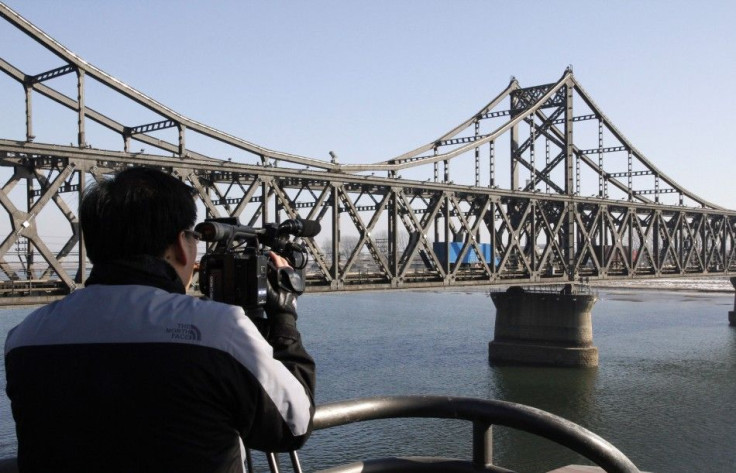North Korea-China Border In Dandong Closed To Tourists; Chinese Tours Canceled

Local tour groups in Dandong, an important border city that links China with North Korea, have canceled all trips to Pyongyang amid growing nuclear threats.
Explore North Korea, which caters mostly to Chinese tourists, posted a message on its Facebook page late Tuesday stating: “Because the situation in North Korea. All the tour will be canceled since now [sic].”
The agency said it had a two-hour-long meeting with local travel agencies in Dandong, which led to the decision.
“We will updating the reopen [sic] the tour to North Korea as soon as we got [sic] the official information from North Korea.”
A spokesperson for the tour company confirmed to IBTimes that all trips for Chinese tourists based out of Dandong, just across the river from North Korea, have been suspended.
“The border is open, but the tours are canceled,” the Explore North Korea spokesperson said. “We don’t know the reason to cancel but we got information from the Chinese tourism bureau to cancel.”
An official at the Dandong Border Office confirmed to Agence France-Presse that travel agencies are not allowed to take tourist groups across the border “because the North Korean government is now asking foreign people to leave.”
“As far as I know, business people can enter and leave North Korea freely," he added.
Most trade between China and North Korea passes through the frontier town, located on the Yalu River.
Explore North Korea had five more tours to the "Democratic People’s Republic of Korea" via train from Dandong this month. Its last tour returned on April 6.
The two main North Korea tour operators catering to Western tourists remained adamant, however, that they would continue tours, despite heightened tensions on the Korean Peninsula.
Christopher White, travel director of China-based Young Pioneer Tours, said his organization would send 100 people into North Korea via Beijing this month and a total of 1,000 people this year, twice as much as in 2012. He said what’s happening right now “is a big smokestack” and that Young Pioneer Tours would not cancel a trip unless they were told they were not allowed to go in.
“I have been informed about Dandong canceling tours for Chinese. I have also been told Chinese can still enter via Beijing,” White said. “We’ve been going in and out for five years and several events have happened during that time, but it hasn’t affected the way we’re treated or how we operate.”
Nick Bonner of Koryo Tours agreed. He’s taken tour groups into the DPRK since 1989 and said his company would not cancel trips unless it received specific advice to do so from the British, Swedish or German Embassy in North Korea.
“We have been running tours almost every month to North Korea since 1993 and in these 20 years have experienced similar situations and probably have the best on the ground experience possible,” Bonner said. “We also work with North Korean partners who have a responsible and professional attitude and they would be the first to cancel tourist visas to the country if they thought there would be any difficulties.”
Hannah Barraclough, also from Koryo Tours, added that she had reached out to her contacts in North Korea Wednesday morning and reported business as usual.
“Nothing has changed,” she said from her Beijing office. The company rarely enters through the Dandong crossing, Barraclough added, and she was unaware of any North Korean officials “asking foreign people to leave.”
On Tuesday, Pyongyang warned foreigners based in South Korea to prepare for evacuation in the event of a “thermo-nuclear” war in the coming days. It also advised foreign embassies in North Korea to evacuate because it would be unable to guarantee diplomats’ safety if conflict were to break out. Both warnings have largely been dismissed as empty rhetoric.
Relations between North Korea and South Korea plummeted in recent weeks after the United Nations condemned the hermetic nation’s third nuclear test in February.
Meanwhile, state media outlet Korea Central News Agency ran a series of reports claiming that North Korea had experienced an unprecedented surge in visitor applications. Last year, approximately 4,000 Westerners and 20,000 Chinese visited the nation -- despite lengthy travel warnings from most nations. Chinese predominantly came in for trips 48 hours or less, while most Westerners came in with groups like Young Pioneer Tours or Koryo Tours.
In response to a perceived increase in interest, the state airline, Air Koryo, added two additional flights per week between Beijing and Pyongyang this month. The government also expanded its railway timetable and added faster trains between the Chinese border and the North Korean capital.
What will happen in the coming weeks, however, remains to be seen.
© Copyright IBTimes 2024. All rights reserved.












